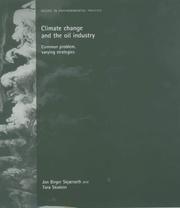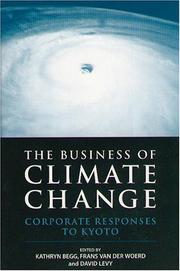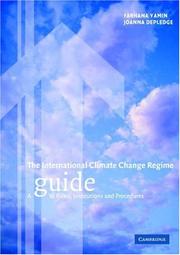| Listing 1 - 10 of 15 | << page >> |
Sort by
|
Book

ISBN: 9085841038 Year: 2005 Publisher: Brugge Vanden Broele
Abstract | Keywords | Export | Availability | Bookmark
 Loading...
Loading...Choose an application
- Reference Manager
- EndNote
- RefWorks (Direct export to RefWorks)
klimaatverandering --- Kyoto-protocol --- 540 Luchtverontreiniging --- emissierechten --- Broeikaseffect --- broeikaseffect --- fiscaliteit --- boekhouding --- duurzame ontwikkeling --- milieubeleid --- milieuproblematiek --- milieuvervuiling --- wetgeving
Dissertation
Abstract | Keywords | Export | Availability | Bookmark
 Loading...
Loading...Choose an application
- Reference Manager
- EndNote
- RefWorks (Direct export to RefWorks)
Doelstelling: De doelstelling van deze scriptie is een overzicht te bieden van het beeld dat wetenschappers schetsen van de rol die het Engels tegenwoordig speelt in de wereld en op internationale conferenties. Daarbij zal de invloed die het Engels heeft in Europa uitvoeriger besproken worden en zal worden nagegaan in welke mate Europese sprekers Engels beheersen. Middelen of methode: Vanuit een literatuurstudie, aangevuld met twee pilotstudies, werd een antwoord op de onderzoeksvragen gegeven. In de eerste pilot study werden conferentieorganisatoren gecontacteerd met een vragenlijst over Europese conferenties inzake emissierechten. In de tweede pilot study werden tien conferenties geselecteerd en werd, via het internet en contact met de organisatoren, nagegaan wat de moedertaal was van de aanwezige sprekers. Resultaten: Uit de literatuurstudie blijkt dat Engels wereldwijd door een aanzienlijk aantal mensen wordt gesproken. Verder blijkt dat inwoners van verschillende Europese regio's op een andere manier Engels praten. Het empirisch onderzoek toont aan dat Engels ook het vaakst wordt aangewend als voertaal op Europese conferenties inzake emissies.
Conference. --- Emission rights. --- English. --- Euro-English. --- Interpreting. --- Kyoto protocol. --- Lingua franca. --- Mother tongue. --- Tolkstudie. --- Working language.

ISBN: 9059720644 Year: 2005 Publisher: Delft Eburon
Abstract | Keywords | Export | Availability | Bookmark
 Loading...
Loading...Choose an application
- Reference Manager
- EndNote
- RefWorks (Direct export to RefWorks)
Environmental protection. Environmental technology --- Meteorology. Climatology --- Professional ethics. Deontology --- klimaat --- Kyoto-protocol --- CLIMATE CHANGE -- 323.39 --- CLIMATE CHANGE -- 327.3 --- Energie --- Algemeen --- 540 Luchtverontreiniging --- Broeikaseffect --- 061 Ethische problemen --- Milieubeleid 504.7:338 --- Luchtverontreiniging 614.71 --- Maatschappelijke ontwikkeling 304 --- Sociaal beleid 304:32 --- Klimaat 504.38 --- 551.58 klimaat --- 551.583 klimaatverandering --- 170 ethiek --- Algemeen. --- Monograph

ISBN: 1862031681 Year: 2006 Publisher: London Chatham House
Abstract | Keywords | Export | Availability | Bookmark
 Loading...
Loading...Choose an application
- Reference Manager
- EndNote
- RefWorks (Direct export to RefWorks)
Environmental policy --- Emissions trading --- Air --- Emissions credit trading --- Emissions rights trading --- Marketable permits for carbon dioxide emissions --- Tradeable emission permits --- Trading emissions credits --- Carbon offsetting --- Carbon taxes --- Pollution --- United Nations Framework Convention on Climate Change --- Jingdu tiao yue --- Jingdu xie yi shu --- Jingdu yi ding shu --- Konvensi Perubahan Iklim --- Kyōto giteisho --- Kyoto Protocol --- Kyoto Treaty --- Lian he guo qi hou bian hua kuang jia gong yue de Jingdu yi ding shu --- Protokol Kyoto --- Protokol Kyoto Untuk Konvensi Kerangka Kerja PBB Tentang Perubahan Iklim --- 京都协议书 --- 京都条约 --- 京都議定書 --- 京都议定书 --- 联合国气候变化框架公约的京都议定书

ISBN: 1781700478 1280734515 9786610734511 1847790828 1423706544 0719065585 0719065593 9781280734519 9781526137296 6610734518 9781847790828 9781423706540 1526137291 Year: 2003 Publisher: Manchester : New York : Manchester University Press : Distributed exclusively in the USA by Palgrave,
Abstract | Keywords | Export | Availability | Bookmark
 Loading...
Loading...Choose an application
- Reference Manager
- EndNote
- RefWorks (Direct export to RefWorks)
Multinational corporations are not merely the problem in environmental concerns, but could also be part of the solution. The oil industry and climate change provide the clearest example of how the two are linked; what is less well-known is how the industry is responding to these concerns. This volume presents a detailed study of the climate strategies of ExxonMobil, Shell and Statoil. With an innovative analytical approach, the authors explain variations at three decision-making levels: within the companies themselves, in the national home-bases of the companies, and at an international level. The analysis generates policy-relevant knowledge about whether and how corporate resistance to a viable climate policy can be overcome. The analytical approach developed by the authors is also applicable to other areas of environmental degradation where multinational corporations play a central role. The book is invaluable to students, researchers and practitioners interested in national and international environmental politics and business environmental management.
Petroleum industry and trade --- Gas industry --- Industrial management --- Greenhouse gas mitigation. --- Climatic changes. --- Environmental aspects. --- Changes, Climatic --- Climate change --- Climate changes --- Climate variations --- Climatic change --- Climatic changes --- Climatic fluctuations --- Climatic variations --- Global climate changes --- Global climatic changes --- Abatement of greenhouse gas emissions --- Emission reduction, Greenhouse gas --- Emissions reduction, Greenhouse gas --- GHG mitigation --- Greenhouse gas abatement --- Greenhouse gas emission reduction --- Greenhouse gas emissions reduction --- Greenhouse gas reduction --- Mitigation of greenhouse gas emissions --- Reduction of greenhouse gas emissions --- Natural gas industry --- Environmental aspects --- Climatology --- Climate change mitigation --- Teleconnections (Climatology) --- Pollution prevention --- Energy industries --- Changes in climate --- Climate change science --- Global environmental change --- environmentalism --- oil --- exxon --- multinational --- Climate change (general concept) --- Equinor --- ExxonMobil --- Fossil fuel --- Kyoto Protocol --- Netherlands --- Norway --- Petroleum industry --- Politics of global warming --- Royal Dutch Shell

ISBN: 1874719578 9786610155545 1909493481 128015554X 1351281682 9781909493483 9781874719571 9781280155543 6610155542 9781351281683 9781351281652 1351281674 1351281666 Year: 2017 Publisher: London : Routledge,
Abstract | Keywords | Export | Availability | Bookmark
 Loading...
Loading...Choose an application
- Reference Manager
- EndNote
- RefWorks (Direct export to RefWorks)
"In recent years climate change has become a leading issue on both the business and political agenda. With the Kyoto Protocol to the UN Framework Convention on Climate Change now ratified, business is bracing itself for the reality of serious regulation on the reduction of greenhouse gas emissions.The Business of Climate Change presents a state-of-the-art analysis of corporate responses to the climate change issue. The book describes and assesses a number of recent business approaches that will help to identify effective strategies and promote the dissemination of proactive corporate practices on climate change worldwide. By identifying the factors that cause companies to pursue low-carbon strategies and support the Kyoto process, the book will also be helpful to governments in formulating policy.Business and industry have a crucial role to play in the implementation of the Kyoto Protocol. They are major emitters of greenhouse gases, and pressure is mounting for them to engage in a range of mitigation strategies, from emission inventorying and trading schemes to investments in low-carbon technologies. Behind the scenes a number of companies have started to develop strategies to curtail greenhouse gas emissions.These strategies can be very diverse in nature. At a political level, companies try to influence policy implementation and, more specifically, to test ideas in anticipation of possible regulation on the climate change issue. At a more practical level, there are a burgeoning number of initiatives to conserve energy use in production, transportation and buildings, to develop renewable sources of energy, to measure carbon emissions and sequestration at a detailed level, and to develop various markets for trading carbon credits among companies and countries. Some technologies, such as hybrid cars and compact fluorescent lighting, are now market realities.Common to all of these initiatives is that they operate in an environment of high complexity and uncertainty. The political implementation of the Kyoto Protocol remains uncertain and many details remain unspecified. Economic instruments such as emission trading are favoured, but their mechanisms are still hotly debated and the future price of credits is unknown. New markets for low-emission products and technologies are beginning to appear, but there are currently few regulatory drivers to assist their development. The impact of potential regulation on business will vary tremendously between companies and sectors. The fossil fuel and energy sectors fear the economics of action, while sectors such as insurance and agriculture fear the economics of inaction. Combined with the remaining uncertainties about what form climate change may take, corporate responses to reduce risks have to differentiate between sectors and have to be flexible. For individual companies, these big uncertainties demand new thinking and contingency planning.The Business of Climate Change is split into four sections: "Introduction and overview" presents a broad perspective on business and climate policies"--Provided by publisher.
Air -- Pollution -- Economic aspects. --- Climatic changes -- Economic aspects. --- Climatic changes -- Government policy. --- United Nations Framework Convention on Climate Change (1992). Protocols, etc., 1997 December 11. --- Air --- Climatic changes --- Environmental policy --- Business & Economics --- Economic History --- Pollution --- Economic aspects --- Government policy --- Environmental policy. --- Economic aspects. --- Government policy. --- United Nations Framework Convention on Climate Change --- milieuproblematiek --- duurzame ontwikkeling --- duurzaam ondernemen --- broeikaseffect --- milieubeleid --- Environment and state --- Environmental control --- Environmental management --- Environmental protection --- Environmental quality --- State and environment --- Jingdu tiao yue --- Jingdu xie yi shu --- Jingdu yi ding shu --- Konvensi Perubahan Iklim --- Kyōto giteisho --- Kyoto Protocol --- Kyoto Treaty --- Lian he guo qi hou bian hua kuang jia gong yue de Jingdu yi ding shu --- Protokol Kyoto --- Protokol Kyoto Untuk Konvensi Kerangka Kerja PBB Tentang Perubahan Iklim --- 京都协议书 --- 京都条约 --- 京都議定書 --- 京都议定书 --- 联合国气候变化框架公约的京都议定书 --- Environmental auditing --- Atmosphere --- Pollution&delete&

ISBN: 0691120269 0691088705 9786613379832 1400824060 128337983X 1400814774 9780691120263 9781400814770 9781400824069 9780691088709 1400818508 Year: 2001 Publisher: Princeton, N.J. Princeton University Press
Abstract | Keywords | Export | Availability | Bookmark
 Loading...
Loading...Choose an application
- Reference Manager
- EndNote
- RefWorks (Direct export to RefWorks)
Even as the evidence of global warming mounts, the international response to this serious threat is coming unraveled. The United States has formally withdrawn from the 1997 Kyoto Protocol; other key nations are facing difficulty in meeting their Kyoto commitments; and developing countries face no limit on their emissions of the gases that cause global warming. In this clear and cogent book-reissued in paperback with an afterword that comments on recent events--David Victor explains why the Kyoto Protocol was never likely to become an effective legal instrument. He explores how its collapse offers opportunities to establish a more realistic alternative. Global warming continues to dominate environmental news as legislatures worldwide grapple with the process of ratification of the December 1997 Kyoto Protocol. The collapse of the November 2000 conference at the Hague showed clearly how difficult it will be to bring the Kyoto treaty into force. Yet most politicians, policymakers, and analysts hailed it as a vital first step in slowing greenhouse warming. David Victor was not among them. Kyoto's fatal flaw, Victor argues, is that it can work only if emissions trading works. The Protocol requires industrialized nations to reduce their emissions of greenhouse gases to specific targets. Crucially, the Protocol also provides for so-called "emissions trading," whereby nations could offset the need for rapid cuts in their own emissions by buying emissions credits from other countries. But starting this trading system would require creating emission permits worth two trillion dollars--the largest single invention of assets by voluntary international treaty in world history. Even if it were politically possible to distribute such astronomical sums, the Protocol does not provide for adequate monitoring and enforcement of these new property rights. Nor does it offer an achievable plan for allocating new permits, which would be essential if the system were expanded to include developing countries. The collapse of the Kyoto Protocol--which Victor views as inevitable--will provide the political space to rethink strategy. Better alternatives would focus on policies that control emissions, such as emission taxes. Though economically sensible, however, a pure tax approach is impossible to monitor in practice. Thus, the author proposes a hybrid in which governments set targets for both emission quantities and tax levels. This offers the important advantages of both emission trading and taxes without the debilitating drawbacks of each. Individuals at all levels of environmental science, economics, public policy, and politics-from students to professionals--and anyone else hoping to participate in the debate over how to slow global warming will want to read this book.
-Greenhouse gas mitigation --- -Abatement of greenhouse gas emissions --- Pollution prevention --- Warming, Global --- Global temperature changes --- Jingdu tiao yue --- Jingdu xie yi shu --- Jingdu yi ding shu --- Konvensi Perubahan Iklim --- Kyōto giteisho --- Kyoto Protocol --- Kyoto Treaty --- Lian he guo qi hou bian hua kuang jia gong yue de Jingdu yi ding shu --- Protokol Kyoto --- Protokol Kyoto Untuk Konvensi Kerangka Kerja PBB Tentang Perubahan Iklim --- 京都协议书 --- 京都条约 --- 京都議定書 --- 京都议定书 --- 联合国气候变化框架公约的京都议定书 --- Greenhouse gas mitigation --- Global warming --- Abatement of greenhouse gas emissions --- Emission reduction, Greenhouse gas --- Emissions reduction, Greenhouse gas --- GHG mitigation --- Greenhouse gas abatement --- Greenhouse gas emission reduction --- Greenhouse gas emissions reduction --- Greenhouse gas reduction --- Mitigation of greenhouse gas emissions --- Reduction of greenhouse gas emissions --- Government policy. --- United Nations Framework Convention on Climate Change --- Environmental protection. Environmental technology --- Human ecology. Social biology --- Sociology of culture --- Government policy --- Réchauffement de la Terre --- Gaz à effet de serre --- Politique gouvernementale --- Réduction --- Global warming - Government policy --- Greenhouse gas mitigation - Government policy

ISBN: 0521600596 0521840899 1107151317 9786610415830 0511183194 0511206690 051131129X 0511494653 1280415835 0511136773 0511134584 9780521600590 Year: 2004 Publisher: Cambridge : Cambridge University Press,
Abstract | Keywords | Export | Availability | Bookmark
 Loading...
Loading...Choose an application
- Reference Manager
- EndNote
- RefWorks (Direct export to RefWorks)
This book presents a comprehensive, authoritative and independent account of the rules, institutions and procedures governing the international climate change regime. Its detailed yet user-friendly description and analysis covers the UN Framework Convention on Climate Change, the Kyoto Protocol, and all decisions taken by the Conference of the Parties up to 2003, including the landmark Marrakesh Accords. Mitigation commitments, adaptation, the flexibility mechanisms, reporting and review, compliance, education and public awareness, technology transfer, financial assistance and climate research are just some of the areas that are reviewed. The book also explains how the regime works, including a discussion of its political coalitions, institutional structure, negotiation process, administrative base, and linkages with other international regimes. In short, this book is the only current work that covers all areas of the climate change regime in such depth, yet in such a uniquely accessible and objective way.
Climatic changes --- Environmental management --- Global warming --- Government policy. --- International cooperation. --- United Nations Framework Convention on Climate Change --- Meteorology. Climatology --- #SBIB:327.7H42 --- #SBIB:35H434 --- Government policy --- International cooperation --- Specifieke internationale organisaties en samenwerking: milieu --- Beleidssectoren: milieubeleid en ruimtelijke ordening --- International relations. Foreign policy --- Environmental law --- Law --- General and Others --- Jingdu tiao yue --- Jingdu xie yi shu --- Jingdu yi ding shu --- Konvensi Perubahan Iklim --- Kyōto giteisho --- Kyoto Protocol --- Kyoto Treaty --- Lian he guo qi hou bian hua kuang jia gong yue de Jingdu yi ding shu --- Protokol Kyoto --- Protokol Kyoto Untuk Konvensi Kerangka Kerja PBB Tentang Perubahan Iklim --- 京都协议书 --- 京都条约 --- 京都議定書 --- 京都议定书 --- 联合国气候变化框架公约的京都议定书 --- Convention cadre des Nations Unies sur le changement climatique --- Changement climatique --- Réchauffement global --- Gestion de l'environnement --- politiques gouvernementales --- coopération internationale

ISBN: 113656330X 1280475196 9786610475193 1849771685 6000000707 1417583118 9781849771689 9781844071616 1844071618 9781280475191 9781417583119 6610475199 9786000000707 9781136563256 9781136563294 9781136563300 9781138992405 1136563296 Year: 2005 Publisher: London ; Sterling, Va. : Earthscan,
Abstract | Keywords | Export | Availability | Bookmark
 Loading...
Loading...Choose an application
- Reference Manager
- EndNote
- RefWorks (Direct export to RefWorks)
Global warming is the most severe environmental challenge faced by humanity today and the costs of responding effectively will be high. While Russia's ratification of the Kyoto Protocol ensures the treaty's entry into force, lack of capacity, or incentives to renege on their commitments, will impede mitigation efforts in many countries. An important prerequisite for the proper functioning of the Protocol is that its compliance system - which is spelled out by the Marrakesh Accords - proves effective. Implementing the Climate Regime describes and analyses Kyoto's compliance system. Organized in
Climatic changes. --- Climatic changes --- Greenhouse gas mitigation --- Changes, Climatic --- Changes in climate --- Climate change --- Climate change science --- Climate changes --- Climate variations --- Climatic change --- Climatic fluctuations --- Climatic variations --- Global climate changes --- Global climatic changes --- Climatology --- Climate change mitigation --- Teleconnections (Climatology) --- Government policy. --- International cooperation. --- Environmental aspects --- United Nations Framework Convention on Climate Change --- Jingdu tiao yue --- Jingdu xie yi shu --- Jingdu yi ding shu --- Konvensi Perubahan Iklim --- Kyōto giteisho --- Kyoto Protocol --- Kyoto Treaty --- Lian he guo qi hou bian hua kuang jia gong yue de Jingdu yi ding shu --- Protokol Kyoto --- Protokol Kyoto Untuk Konvensi Kerangka Kerja PBB Tentang Perubahan Iklim --- 京都协议书 --- 京都条约 --- 京都議定書 --- 京都议定书 --- 联合国气候变化框架公约的京都议定书 --- Global environmental change --- Climatic changes - Government policy --- Greenhouse gas mitigation - International cooperation

ISBN: 1280035560 9786610035564 9264189165 9264185615 Year: 2000 Publisher: Paris : OECD Publishing,
Abstract | Keywords | Export | Availability | Bookmark
 Loading...
Loading...Choose an application
- Reference Manager
- EndNote
- RefWorks (Direct export to RefWorks)
More than 27% of total carbon dioxide emissions in OECD countries is produced by the transport sector, and there are still few signs that transportation energy use is peaking. Without new action, the prospects for reductions in CO2 emissions from this sector look bleak. This report reviews transport-related CO2 abatement policies in six IEA countries: Denmark, Germany, the Netherlands, Sweden, the United Kingdom and the United States. The report focuses on past, recent and potential future policies and the policy context in each country. It provides a comprehensive description of selected key policy elements. A separate IEA report, which will be published early next year, will offer quantitative estimates of a major element in transport climate-change policy – the potential for reducing CO2 emissions by improving the fuel efficiency of passenger cars.
Automobiles -- Motors -- Exhaust gas -- Law and legislation. --- Carbon dioxide mitigation -- Law and legislation. --- Greenhouse gas mitigation. --- Greenhouse gases. --- Transportation and state. --- United Nations Framework Convention on Climate Change (1992). Protocols, etc., 1997 Dec. 11. --- Carbon dioxide mitigation --- Automobiles --- Transportation and state --- Civil & Environmental Engineering --- Engineering & Applied Sciences --- Environmental Engineering --- Government policy --- Law and legislation --- Motors --- Exhaust gas --- State and transportation --- Transportation --- Transportation policy --- Autos (Automobiles) --- Cars (Automobiles) --- Gasoline automobiles --- Motorcars (Automobiles) --- Atmospheric carbon dioxide mitigation --- Carbon dioxide capture --- Mitigation of carbon dioxide --- Motor vehicles --- Transportation, Automotive --- Pollution prevention --- United Nations Framework Convention on Climate Change --- Jingdu tiao yue --- Jingdu xie yi shu --- Jingdu yi ding shu --- Konvensi Perubahan Iklim --- Kyōto giteisho --- Kyoto Protocol --- Kyoto Treaty --- Lian he guo qi hou bian hua kuang jia gong yue de Jingdu yi ding shu --- Protokol Kyoto --- Protokol Kyoto Untuk Konvensi Kerangka Kerja PBB Tentang Perubahan Iklim --- 京都协议书 --- 京都条约 --- 京都議定書 --- 京都议定书 --- 联合国气候变化框架公约的京都议定书 --- Motor fuels --- Gaz carbonique --- Transport --- Carburants --- Environmental aspects --- Moteurs --- Gaz d'échappement --- Droit --- Réduction --- Politique gouvernementale --- Aspect de l'environnement
| Listing 1 - 10 of 15 | << page >> |
Sort by
|

 Search
Search Feedback
Feedback About
About Help
Help News
News